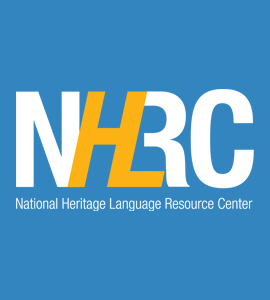Ninth Heritage Language Research Institute
From bilingual children to adult heritage speakers
The University of Washington has the honor of hosting this year’s Heritage Language Research Institute, organized by the National Heritage Language Research Center at UCLA.
JUNE 15- 18, 2016
UNIVERSITY OF WASHINGTON, SEATTLE
Director: Maria Polinsky (University of Maryland, College Park)
Workshop Director: Maria Luisa Parra (Harvard University)
Heritage languages are learned early in life, either simultaneously with the dominant language or prior to the acquisition of the dominant language of the country. Early childhood bilinguals are often fluent in both languages, their home language and the dominant societal language. Furthermore, both languages influence each other in early childhood bilinguals. Many of such bilinguals grow up to become adult heritage speakers who are typically stronger in the dominant language and whose knowledge of the home language is less strong.
How do bilingual children turn into adult heritage speakers? What are the vulnerable domains in the languages of both populations, what are their strengths, and where are the differences? And how can we preserve and maintain the relative stability of early childhood bilingualism? The Institute will bring together language scientists and language educators who will examine these issues from the standpoint of research, language planning, and linguistic training.
For more details about the schedule, presenters, location, and Saturday workshop, visit: http://nhlrc.ucla.edu/nhlrc/events/institute/2016/home.
Registration for all 4 days is only $100. Free clock hours for teachers will be available.
On Saturday, June 18, 2016, there will be a special one-day workshop:
Workshop: Project-based learning and the teaching of heritage languages
The purpose of this day-long workshop is for participants to become familiar with a range of project-based experiences designed for the teaching of heritage languages at different educational levels.
Project-based learning aims to engage students in tasks that require them to explore, investigate, create and, sometimes, respond to complex questions, solve problems, or meet challenges. Such projects involve important cognitive, linguistic, critical thinking, and social skills. For these reasons, this teaching-learning method suits the needs of heritage language learners at all levels as it fosters: the use of the language (and its different registers); the development of written heritage language skills; language and cultural awareness; and potential connections and involvement with the heritage community.
Presenters:
- Olga Kagan (UCLA): Project-based learning in the context of heritage language teaching: an introduction
- María Carreira (Cal State University Long Beach): Differentiated teaching for heritage languages
- Irina Dubinina (Brandeis University): Service learning in the Russian community in Boston
- Helen Yung (Seattle Public Schools): Dual Language Voices and Choices: Project-Based Learning in an after-school Chinese Literacy program for middle school Dual Language Immersion and Heritage Language students
- María Luisa Parra (Harvard University): Journalism for Latino students: Learning, serving and writing about the community.
Registration for the workshop only is $75. Free clock hours for teachers will be available.
Register Now for the workshop.
Many thanks to our local co-sponsors:
University of Washington Co-Sponsors:
- Dean of Arts and Humanities
- Language Learning Center
- Slavic Languages and Literatures
- Asian Languages and Literatures
- Spanish and Portuguese Studies
- Confucius Institute of the State of Washington
- Center for Spanish Studies
- Linguistics Department
- Henry M. Jackson School of International Studies: Global Studies Center
- Ellison Center for Russian, East European, Central Asian Studies, etc.
Community Co-Sponsors:
- One America
- One City Project
Sponsors of Morning Refreshments:
- Avant Assessment
- Santillana Publishing

